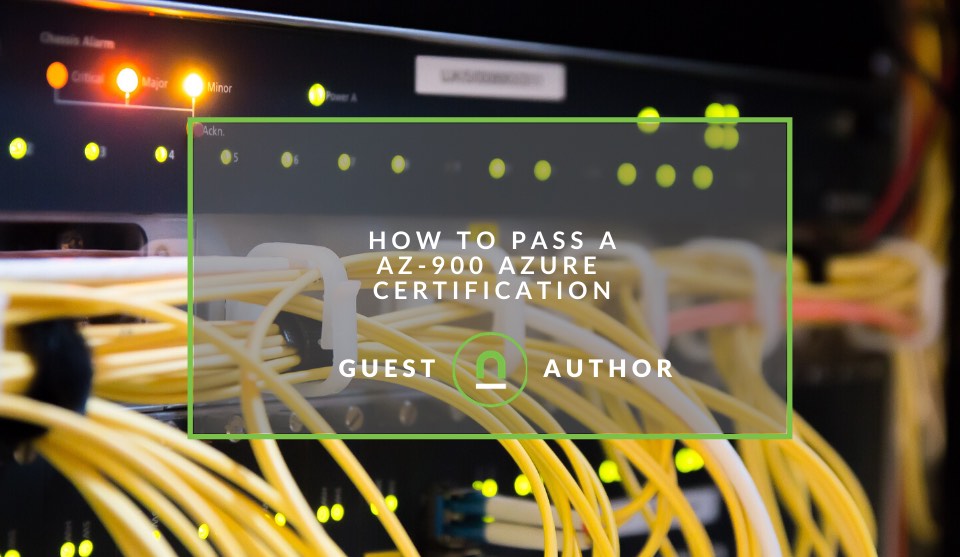Recent posts

Press Releases
Rehab Your Knee: A Free, Evidence-Based Guide to Smarter Recovery
12 February 2026

Money Talks
XRP vs. Stablecoins: Which Is Better for Cross-Border Payments in 2026?
28 January 2026

Press Releases
Sleep Expert Cautioning Against TikTok’s ‘Mouth Taping’ Trend
28 January 2026

Press Releases
Why Vintage Watches Are the Hottest Trend in 2026
27 January 2026
Popular posts
Extravaganza
Trending Music Hashtags To Get Your Posts Noticed
24 August 2018
Geek Chic
How To Fix iPhone/iPad Only Charging In Certain Positions
05 July 2020
Extravaganza
Trending Wedding Hashtags To Get Your Posts Noticed
18 September 2018
Money Talks
How To Find Coupons & Vouchers Online In South Africa
28 March 2019
How To Pass A AZ-900 Azure Certification
08 July 2020 | 0 comments | Posted by Pawan Kumar in Academia
Cloud computing platforms and applications are a crucial part of any organization in today’s world. As organizations handle a lot of business data daily, cloud computing provides them with a secure platform to store, manage, and use this data.
The services of the cloud platforms can be used as per requirement, which in turn helps in cutting costs. Using cloud computing, small and large businesses have been able to minimize their IT expenses.
Popular cloud service providers are Microsoft Azure and Amazon Web Services. Thus, professionals with Azure fundamentals certification have a lot of job opportunities.
Let us look at the basics of Azure.
What is Azure?
Azure is a cloud computing platform offered by Microsoft that allows you to develop, test, manage, and deploy cloud applications. You can execute existing applications or create and scale other applications. Launched in February 2010, this cloud service follows a pay-per-use model that allows you to pay for only the services you use. Small, medium, and even fortune 500 companies all use Azure for their cloud computing needs.
Azure offers four types of cloud services –
- Infrastructure as a Service (IaaS)
- Platform as a Service (PaaS)
- Software as a Service (SaaS)
- Serverless
Once subscribed to Azure, you have access to all the services in the Azure portal. You can use these resources to create virtual machines and cloud-based databases. Moreover, Azure supports multiple programming languages such as C#, Node JS, and Java.
Why is Azure such a preferred cloud service provider?
Due to all the amazing features discussed earlier, Microsoft Azure has become one of the most trusted cloud providers in the world. More than 80% of the Fortune 500 companies, including IBM and Alibaba, use Azure today. Some of the most popular services offered by Azure are –
Compute
Compute services allow you to create and execute Virtual Machines, batch jobs, and build scalable cloud applications. Once deployed, Azure handles everything, including load balancing, provisioning, and monitoring. The service fabric feature allows you to create Microservices. These are applications that contain other smaller applications. Compute resources that you create within the Azure cloud can be configured using the private or public IP address.
Web
Azure lets you build and deploy web applications. Features such as API management, content delivery, reporting, and handling notifications are also available.
Mobile
This enables you to develop and launch cloud applications for mobiles. Features such as tools for creating APIs (Application Programming Interfaces), handling notification services, and back-end tasks are offered.
Storage
Cloud storage services for structured and unstructured data are available at Azure.
The following storage options are offered
- Disk Storage
- Blob Storage
- File Storage
- Queue Storage
Analytics
These provide storage and distributed analytics including features such as –
- Big Data Analytics
- Data Lakes
- Real-time Analytics
- Business Intelligence
- Machine Learning
- Data Warehousing
- Internet of Things
DevOps
This provides tools such as Azure DevOps that support DevOps software development, Application diagnostics, DevOps tool integrations, and test labs for testing software applications.
Advantages of Azure
The key benefits of using Microsoft Azure are –
- You can create Virtual Machines of your preferred configuration. Virtual hard drives are offered for storage.
- Application creating, testing, and deployment takes very little downtime. The integrated development environment allows multiple teams to master Azure quickly, and the pay as you go, model, makes things cost-efficient.
- Data stored in Azure data centres are highly secure. It is hack-proof as the data centres have features such as two-tier authentication, a global incident response team, and proxy card access readers.
- Real-time auto-updates allow the cloud infrastructure to be up to date, which in turn helps the business to grow and handle their operations seamlessly.
- Built-in analytics support allows businesses to derive insights from business data and make important organizational decisions.
As more companies begin adopting Azure, professionals need to equip themselves with the basics of Azure. Some form of training or certification can immensely help here.
Azure certifications
Azure Certifications are categorized into three levels – fundamental, associate, and expert level. The most popular Azure certifications are –
- Microsoft Certified: Azure – Fundamentals Exam AZ-900
- Microsoft Certified: Azure Administrator – Associate Exam AZ-103
- Microsoft Certified: Azure Developer – Associate Exam AZ-203
- Microsoft Certified: Azure Security Engineer – Associate Exam AZ-500
- Microsoft Certified: Azure AI Engineer – Associate Exam AI-100
- Microsoft Certified: Azure Data Scientist – Associate Exam DP-100
- Microsoft Certified: Azure Data Engineer – Associate Exams DP-200 and DP-201
- Microsoft Certified: Solutions Architect – Expert Exams AZ-300 and AZ-301
- Microsoft Certified: Azure DevOps Engineer – Expert Exam AZ-400
AZ-900 Azure certification
This course is aimed at teaching the candidates the fundamentals of Azure. It has no prerequisites and even non-tech candidates who are selling or marketing Azure services are also eligible.
Exam details
- Number of questions – 40 to 60
- Exam Duration – 85 minutes
- Passing score – 700
- Price - $99
Topics covered
- High Availability, Scalability, Disaster Recovery, and Fault Tolerance
- Architectural Components, Azure Resource Manager, Availability Zones and Resource Groups
- Network Security Group, DDoS Attack and Prevention,
- Azure Firewall Azure Subscription, Free Account and Purchasing Azure products/services
How to pass the AZ-900 certification?
Just like any exam, you have to put in the hard work to pass the AZ-900 fundamentals exam. Start with understanding the basics of the key domains –
- Basic cloud concepts such as SaaS, IaaS, PaaS, Public Cloud, Private Cloud, and Hybrid Cloud
- Core Azure services
- Security, trust, compliance, and privacy
- Azure pricing and support
The different resources to learn Azure fundamentals are –
- The Azure fundamentals online course on Microsoft Learn e-learning platform
- Microsoft documentation page that consists of a page dedicated to Azure fundamentals
- Joining a training program conducted by an instructor
- You can join forums and online study groups
- Reference books such as Microsoft Azure For Beginners by Adney Ainsley and
- Microsoft Azure Tutorial for Beginners by Dennis Hutten
- Sample tests online
As the AZ-900 Azure Certification tests your knowledge of Azure basics, be sure to have a clear understanding of these concepts. You can also check out ebooks, whitepapers, and analyst reports published online for your preparation.
Tell us your story
Would you like to write for nichemarket just like Pawan has? Find out how to submit a guest post and when you're ready, you can contact us.
Are you looking to promote your business?
South African education businesses can create your free business listing on nichemarket. The more information you provide about your business, the easier it will be for your customers to find you online.
Registering with nichemarket is easy; all you will need to do is head over to our sign up form and follow the instructions. If you require a more detailed guide on how to create your profile or your listing, then we highly recommend you check out the following articles.
Recommended reading
If you enjoyed this post and have time to spare why not check out these related posts and dive deeper down the rabbit hole that is education
- What Is The International Day of Education?
- How To Get An MBA Online In South Africa
- The Microsoft 70-346 Exam: Its Lifecycle and Its Replacement
- Tips For Passing Microsoft Certification Exams
Tags: Azure , Guest Post
You might also like
Common ASO Mistakes African App Developers Make
09 January 2026
Posted by Daniel Davis in Industry Experts
ASO is Localisation, Not Translation: Failing to research specific local search terms and cultural nuances is the biggest ASO error in African market...
Read moreThe Rise of AI Computing Power Assets
16 January 2026
Posted by Rehman Ali in Press Releases
An introduction to Cloud mining and monetising cloud computing as DLMining Reshapes Wall Street's New Anti-Inflation Investment Paradigm
Read more{{comment.sUserName}}
{{comment.iDayLastEdit}} day ago
{{comment.iDayLastEdit}} days ago
 {{blogcategory.sCategoryName}}
{{blogcategory.sCategoryName}}


